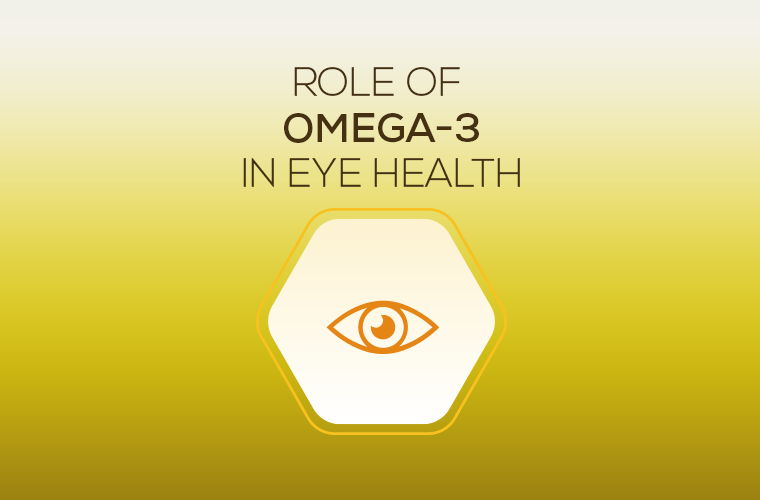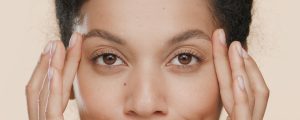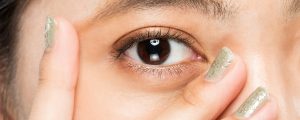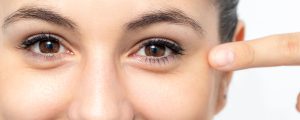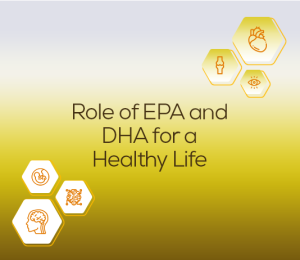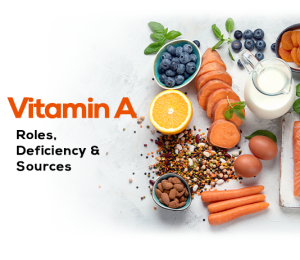Good eyesight helps you perform well at everything that you do – whether it’s managing household chores, doing office work, driving or just enjoying the world. They are the primary receptors to the outside world. They are delicate organs and prone to damage from aging, lifestyle factors, overexposure to light and staring at screens. Taking care of eyes is simple – a mix of correct lifestyle choices, avoidance of certain damaging factors and the right nutrition.
So, how to take care of your eyes? Dive right in
Factors Affecting Eye Heаlth
Multiple factors such as lifestyle factors, ignorance of eye health, poor diet, family traits can affect the health of your eyes [1]. Continuous usage of screens and low light usage are modern day factors that have a tremendous effect on your eyes. Wondering which factors affect your eye health? Check out the list of key factors that affect health of your eyes
1. Smoking
Effects of smoking on the lungs through your breathing patterns, and on the heart and your heart are still well known but it is a less recognized fact that heavy smoking can take a toll on your eyesight as well. Cigarettes contain harmful toxins that can enter your eyes while smoking and increase the risk of vision loss. Smoking is also known to cause oxidative stress that may damage the blood vessels of the eyes as well as the retina. The harmful compounds from cigarette smoking can also lead to a reduction in different layers of the brain that process vision. Vasoconstriction or narrowing of the blood vessels due to smoking can lower the supply of blood to your eyes [2] [3]. In its severe condition, smoking can cause blindness due to retinal artery occlusion and retinal disease. [4]
2. Lights and Harmful Chemicals
Excessive exposure to cleaning chemicals, powerful floodlights, photographer’s halogen lights can cause eye damage. Continuously exposed personnel needs to take required safety measures like wearing recommended safety goggles and eye-guards.
3. Exposure to Sunlight/ UV Rays
Overexposure to UV rays can hаve adverse effects on your eye health as well. It can increase the risk of cataract formation and retinal degeneration. [5] [6]
4. Overexposure to Screens
The modern lifestyle which includes a continuous staring of screens be it TV, laptops, mobiles or tablets has drastically increased the risk to eyes. Extended screen time is drasticаlly increasing dry eyes, eye strain, and fatigue and is thought to cause subsequent cases of myopia in both children and adults. Studies have suggested that UV-free exposure to bright natural light and exercising long-range sight regularly can help counteract the increase in short-sightedness. [5] [7]
5. Contact Lens Hygiene
While contact lenses provide multiple vision benefits, they come with their own set of problems. Maintaining hygiene during contact lens is important to avoid bacterial infection and for maintaining eye health. Practices such as topping up contact lens solutions with tap water or not changing the lenses on time create a significantly higher risk of bacterial and fungal infections. [8] [9]
6. Stress and Fatigue
Your visual system is very sensitive to stress, tension, and fatigue of any kind, whether it’s physical, emotional or mental. Stress and fatigue have become a continuing factor in our daily lives and pose a serious risk to overall health including your eyes and vision. When your body is stressed, your pupils start to dilate in order to let more light enter your eyes overexposing retina to light. And when the adrenaline or stress hormone in the adrenal gland is high, your eyes feel excessive pressure and can cause your vision to become blurry [10]. Stress can also cause headaches, dry, itchy eyes.
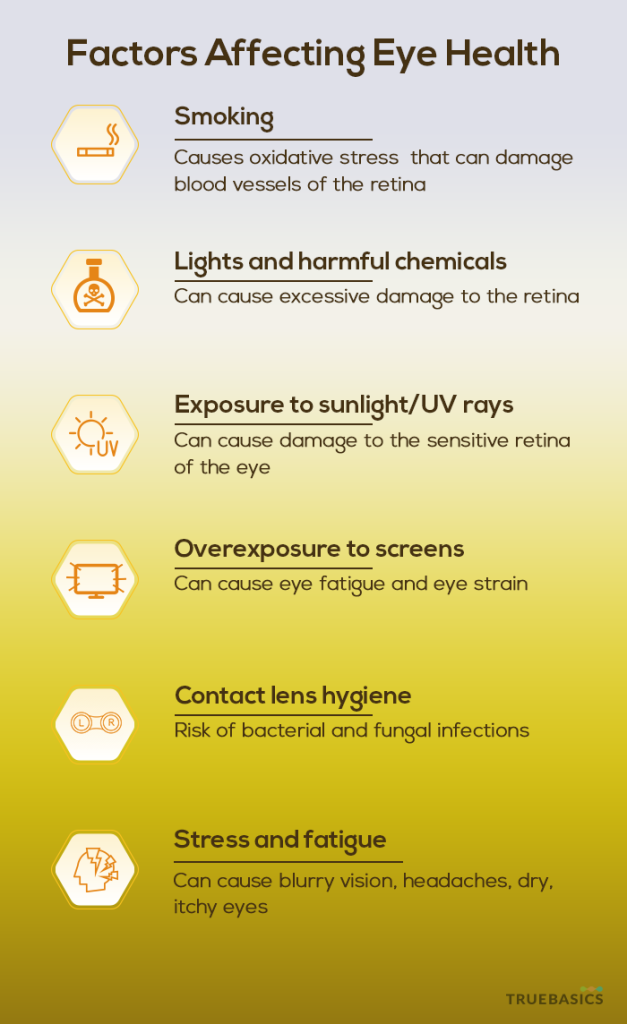
7. Obesity
Obesity is generally characterized by excessive deposits of fat and adipose tissue in the body. While obesity might not affect your eyes directly, conditions associated with obesity such as diabetes, high blood pressure poses risk to the vision and eye health.
8. Unhealthy Diet
A poor diet deficit in key nutrients (especially Vitamin A) can deprive eyes of key nutrient required for growth, and maintenance of the eyes.
Our eyes get their nutrition from the blood vessels. Tiny capillaries provide your retinа with nutrients and oxygen. Due to the smaller size of the blood vessels, fatty deposits from an unhealthy diet can cause blocked veins. [11]
A diet high in saturated fat and sugar may increase your risk of eye disease. On the other hand, healthy foods such as green vegetables, fruits, and a diet rich in Vitamin A, antioxidants and omega-3 can help maintain eye health.
9. Diabetes
Type 2 diabetes is a chronic disease that doesn’t allow the body to utilize insulin normally. The person has high blood sugar (glucose), there is a relative lack of insulin to control it and it is all characterized by insulin resistance. [12]
Type 2 diabetes puts you at risk of several eye conditions, including diabetic retinopathy, which affects the blood vessels in the eye, glaucoma, and can increase the risk of cataract [13] [14]. High blood pressure during diabetes causes your eye lens to swell which can change your ability to see. People with diabetes are susceptible to a higher risk of developing cataracts. They also have a higher risk of glaucoma that damages blood vessels and nerves when the fluid gets trapped in your eyes. [15] [16]
10. Blood Pressure
Patients with high blood pressure should get their eye checked as well. An eye test to check the small blood vessels in the back of your eye can reveal if there is any damage to the eyes due to high blood pressure [17] [18]. High blood pressure affects the blood vessels around your eyes and damages the light-sensitive tissue of the retina which can lead to blurred vision and bleeding in the eyes. If the flow of blood gets blocked, it can damage the optic nerve, leading to vision loss or bleeding within the eyes. [19]
11. Ocular Hypertension
Ocular hypertension or high pressure can cause glaucoma and even lead to blindness in its severity. Some notable symptoms include red eyes and excessive eye pаin. It is seen when the aqueous present in the eyes is produced in excess, is not drained or both. It can be caused due to certain trauma to the eyes or as a side effect to some medication. [20]
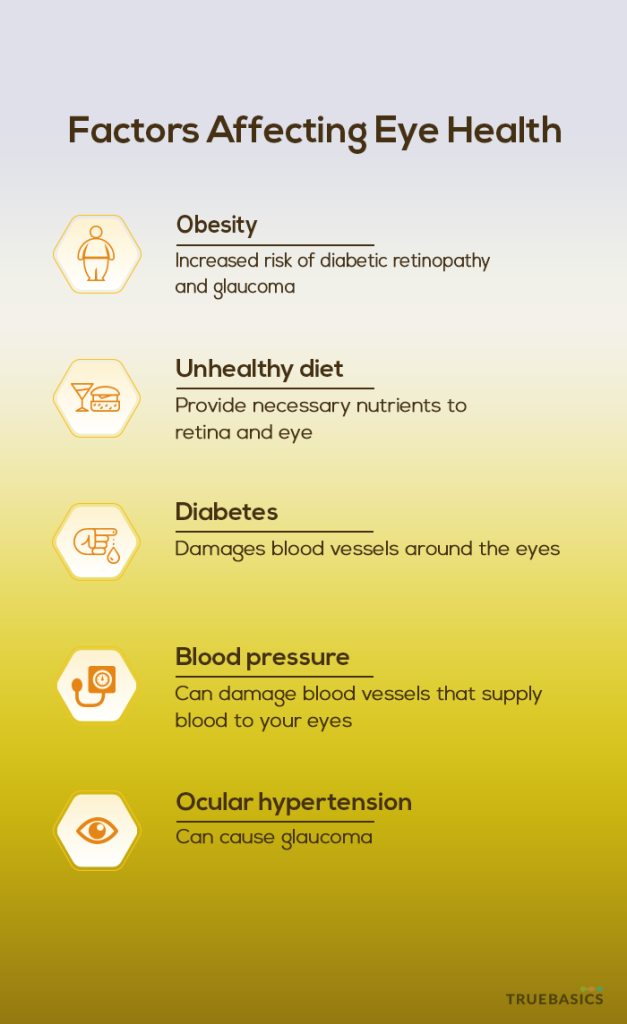
Role of Omegа-3 In Eye Heаlth
Omega-3 fatty acids help regulate biological functions, including cardiovascular, reproductive, immune, and nervous systems [21]. Dive right in to know how adding Omega-3 to daily nutrition can help maintain eye health and alleviate eye problems.
1. Eye Development
Omega-3, especially DHA, is essential for the development of the infant retina during pregnancy. Body organs of a child grow rapidly during the third trimester and first six months after birth. DHA along with ARA (Arachidonic Acid) are major constituents of the tissues of the eyes. It is also found in the breast milk of the mother and thus helps in building proper vision in infants. Therefore, intake of Omega-3 in the daily diet of pregnant and new mothers is recommended. [22]
2. Help Treat Dry Eyes
Tears are necessary to keep your eyes healthy and your vision clear. A layer of tears covers your eyes each time you blink, which protects your eyes from infections, keeps them moist, and washes away dust and debris. Dry eye is a condition marked by inadequate eye lubrication, either due to tear ducts not producing enough tears, or tears evaporating too quickly. Inflammation is both the cause as well as the symptom of dry eyes. Omega-3, owing to its anti-inflammatory properties, helps protect the eyes from inflammation. [23]
Fish Oil and flaxseed oil are important sources of Omega-3 and help in the prevention and treatment of dry eyes. A daily supplement of fish oil and flaxseed oil alone or in tandem with lubricating eye drops helps reduce dry eye symptoms, including burning, stinging, redness and intermittent visual disturbаnces. [24]
3. Protects Eyes Against Diabetic Retinopathy
Diabetic patients are prone to developing diabetic retinopathy, an eye condition that damages the blood vessels of the light-sensitive tissues of the retina (retinal degeneration). Diabetic retinopathy is also one of the leading causes of blindness in adults. Studies report that Omega-3 can positively influence the protection of eyes against this disease. Omega-3 has anti-inflammatory properties and helps in the development of new blood vessels. This helps in preventing retinal cell apoptosis or cell suicide thereby preventing retinal degeneration [25] [26]. Regular intake of DHA can also lead to the production of bioactive mediators. These are chemical compounds that obstruct the growth of abnormal blood vessels, one of the reasons behind retinopathy.
4. Help Treat Glaucoma
Glaucoma refers to a group of eye conditions that can develop when too much fluid pressure builds up inside of the eye. People suffering from glaucoma tend to have low blood levels of DHA. Omega-3 can help adjust the microcirculation blood flow in the eye and the optic nerve. [27]
5. Help Prevent Macular Degeneration
Age related macular degeneration (AMD) is a common eye disorder among people who are more than 50 years old. It causes blurred or reduced central vision, due to the thinning of the macula (the part of the retina responsible for clear vision).
Intake of DHA may help with the prevention of AMD. The retina of the eye uses DHA to regenerate the outer section of the eye’s photoreceptors (the cells in the retina which respond to light) to process light. The retina also uses DHA to protect retinal pigment cells from damage. [28]
6. Reduce Discomfort of Lenses
The wearing of a lens can cause discomfort in the eyes of some people. It can lead to irritation and redness due to dryness in the eye and eyelids, identical to dry eyes, Omega-3 consumption can help reduce the discomfort. The DHA present in the oil helps in retaining moisture in the mucous membranes that reduce irritation and redness. [29]
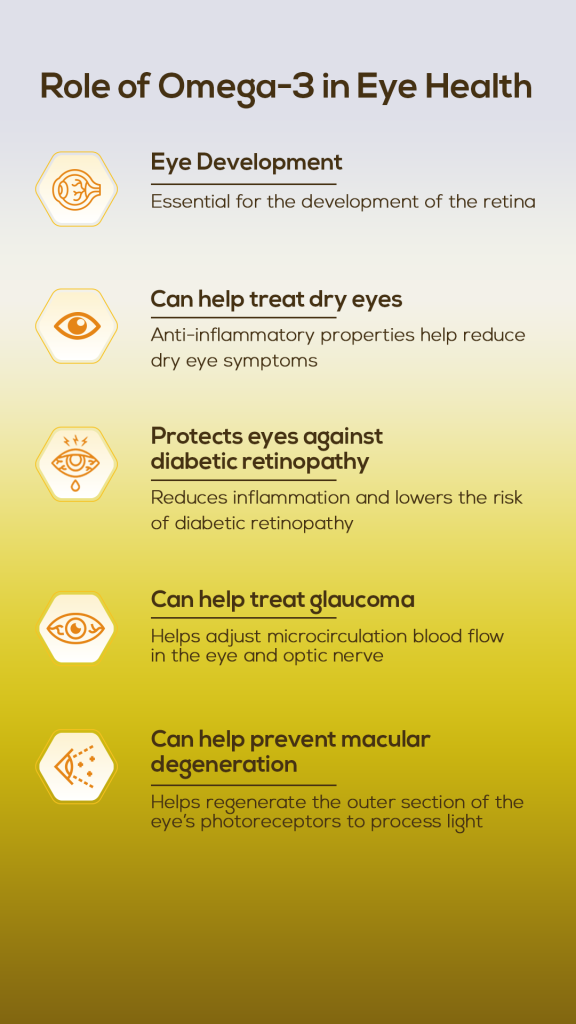
In Conclusion…
The health of your eyes depends on multiple factors like good nutrition, limiting screen usage, avoiding stress, resting your eyes, and taking extra care in diabetic and high blood pressure conditions. Be it your lifestyle, your dietary habits, or work surroundings, your overall health and especially your eyes should come first. It is important to have a balanced diet inclusive of all key nutrients. The anti-inflammatory properties of Omega-3 help prevent eyes against any internal and external damage. It is also beneficial in treating dry eyes, glaucoma, macular degeneration and plays a major role in the development of the retina. Omega-3 can help manage eye health and enable you to have a lifetime of good vision.
Sources:
[1] https://www.ncbi.nlm.nih.gov/pmc/articles/PMC2941200/
[2] https://www.webmd.com/eye-health/news/20190222/study-heavy-smoking-may-damage-vision
[3] https://www.enhancedvision.com/low-vision-info/eye-conditions/causes-of-macular-degeneration.html
[4] https://www.cdc.gov/tobacco/campaign/tips/diseases/vision-loss-blindness.html
[5] https://www.preventblindness.org/how-can-uv-rays-damage-your-eyes
[6] https://www.caringvillage.com/2017/07/19/top-5-eye-problems-resulting-from-uv-exposure/
[7] https://www.health.harvard.edu/blog/will-blue-light-from-electronic-devices-increase-my-risk-of-macular-degeneration-and-blindness-2019040816365
[8] https://www.nvisioncenters.com/contacts/cloudy-vision/
[9] https://www.1800contacts.com/eyesociety/why-is-my-vision-blurry-with-my-contact-lenses/
[10] https://www.allaboutvision.com/conditions/stress-and-vision/
[11] https://www.webmd.com/diet/news/20190403/unhealthy-diets-may-be-worlds-biggest-killer
[12] https://www.cdc.gov/diabetes/basics/type2.html
[13] https://www.medicalnewstoday.com/articles/183417
[14] https://www.nei.nih.gov/learn-about-eye-health/eye-conditions-and-diseases/diabetic-retinopathy
[15] https://www.webmd.com/diabetes/diabetes-eye-problems
[16] https://www.nei.nih.gov/learn-about-eye-health/eye-conditions-and-diseases/diabetic-retinopathy
[17] https://www.webmd.com/hypertension-high-blood-pressure/guide/eye-disease-high-blood-pressure
[18] https://medlineplus.gov/ency/article/000999.htm
[19] https://www.mayoclinic.org/diseases-conditions/high-blood-pressure/in-depth/high-blood-pressure/art-20045868
[20] https://www.bausch.com/your-eye-concerns/diseases-and-disorders/ocular-hypertension
[21] https://ods.od.nih.gov/factsheets/Omega3FattyAcids-HealthProfessional/
[22] https://www.ncbi.nlm.nih.gov/pubmed/29958393
[23] https://www.ncbi.nlm.nih.gov/pmc/articles/PMC4165511/
[24] https://prnomegahealth.com/products/dry-eye-omega-benefits/
[25] https://jamanetwork.com/journals/jama/fullarticle/2630587.
[26] https://www.ncbi.nlm.nih.gov/pubmed/28481011
[27] https://www.ncbi.nlm.nih.gov/pmc/articles/PMC5931260/
[28] https://www.webmd.com/eye-health/macular-degeneration/default.htm
[29] https://www.ncbi.nlm.nih.gov/pubmed/30046817

